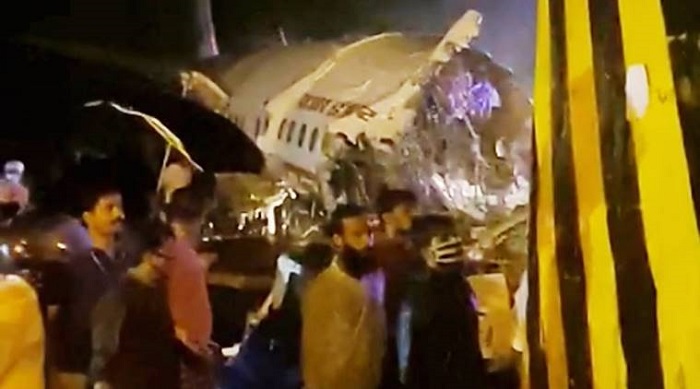
Kozhikode: An Air India Express flight from Dubai with 190 people on board overshot the Kozhikode tabletop runway on landing there today. The Boeing 737 “fell off” the runway into the valley, broke into two causing death and devastation.
According to reports, around 20 people were dead including two pilots.
An Air India spokesperson said: “Air India Express flight IX 1344 operated by Boeing 737 aircraft from Dubai to Calicut overshot the runway at Kozhikode at 7.41 pm Friday. No fire reported at the time of landing. There are 174 passengers, 10 infants, two pilots and five cabin crew on board. Rescue operations are on and passengers are being taken to hospital for medical care. We will soon share the update in this regard.”
The Directorate General of Civil Aviation (DGCA) is probing this accident. “Prima facie, the aircraft landed beyond the touchdown point and fell into a valley. It has broken into two. We suspect some casualties. More information is awaited,” said a senior DGCA official.
Taking to twitter, defence minister Rajnath Singh wrote: “Devastating news from Kozhikode, Kerala. I am deeply anguished by the loss of lives due to an accident carrying several passengers on Air India flight. In this hour of grief, my thoughts are with the bereaved families. I pray for the speedy recovery of the injured.”
Foreign minister S Jaishankar tweeted: “Deeply distressed to hear about the Air India Express tragedy at Kozhikode. Prayers are with the bereaved families and those injured. We are ascertaining further details.”
While, senior BJP leader from Kerala K J Alphons tweeted: “Second tragedy of the day in Kerala: Air India Express skids off the run way at Kozhikode, front portion splits , pilot dies and lots of passengers injured . All passengers evacuated. Very lucky the aircraft didn’t catch fire.”
More details are awaited.
Watch video | Air India flight from Dubai skids off runway in Kerala, splits into two pic.twitter.com/qgGxEEG2e3
— coastaldigest.com (@coastaldigest) August 7, 2020





Comments
Fit for only discuss and diya and to lit candles.Rest of world leaders are struggling to save their citizen and Nation from this pandemic. Till when -----?.
For India only the organisation's and social welfare group and well wishers are in the field and helping.
Definitely with the blessings of patriot Indians they will succeed and they all will continue with their noble cause.
Jai Hind
Add new comment